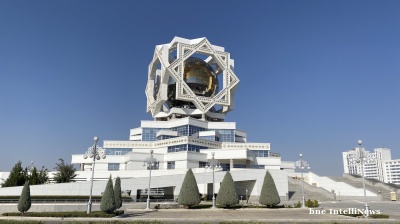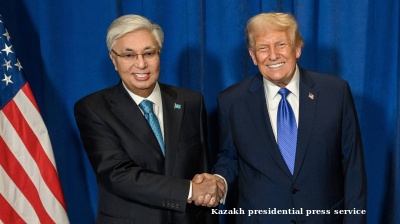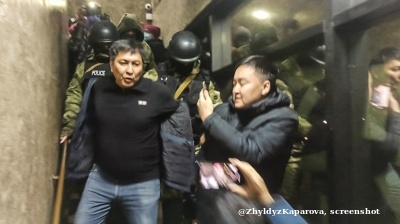As soon as the street fighting broke out following the disputed August 9 presidential election in Belarus, Max Bogretsov, a pioneer of the country’s IT sector, got on a plane and flew to Minsk.
Alexander Lukashenko was returned to office with a landslide victory according to the official results, but it is widely believed these were massively falsified. The Central Election Commission (CEC) immediately burnt the ballots, so no recount is possible and we will never know.
“I arrive a few days later,” Bogretsov told bne IntelliNews in an exclusive interview by phone from the Belarusian capital. “If you had asked me in February if I was going to do anything political this year then I would have laughed at you. But here I am.”
“I got here as soon as I could, a few days after the elections. I am now the man that is keeping [opposition leader jailed ex-banker Viktor] Babariko’s seat warm.”
Listed by IT industry’s Crunchbase, Bogretsov used to work as senior vice-president of technology solutions at Belarus’ premier software company EPAM before he retired. Today he is based in the US and remains active in the business as a manager and an investor.
But everything changed after he touched down in Minsk. Within a month he was invited to join the newly established Coordinating Council, which is a collection of leading Belarusian citizens, to represent the people’s will to Lukashenko. Headed by opposition leader Svetlana Tikhanovskaya and her running mates in the presidential elections Veronika Tsepkalo and Maria Kolesnikova, the Coordinating Council also includes many other significant figures such as Nobel laureate Svetlana Alexievich and former culture minister Pavel Latushko. However, almost all of the members of the council have either been driven into exile or are in jail.
Today Bogretsov, together with union leader Sergey Dylevsky, are the only two members of the council still at liberty in Minsk.

Belarusian IT pioneer Max Bogretsov joined the Coordination Council shortly after returning to Minsk after violence broke out in the wake of the presidential elections in August.
Brain drain
In the last two decades Belarus has become a European IT hub with thousands of start-ups founded in the last decade that cater to both the western and eastern markets, incongruously located in what has been dubbed “Europe’s last dictatorship.” IT has become an engine of growth and the infrastructure that has developed around it – especially the high technology park (HTP) in Minsk – has become a platform for new young entrepreneurs to set up their own businesses.
The Belarusian economy has been hit from all sides this year: by the coronavirus (COVID-19) epidemic’s impact on retail; by the collapse of oil prices; and by Moscow winding down its energy subsidies, to name the most obvious. But probably the worst damage done to the country is the destruction the faux-president has wrought on the country’s IT sector.
During the protests the authorities have been cutting off the internet as they attempt to stymie the demonstration organisers, which has disrupted the IT business.
But even more damaging is the climate of fear and the raids on firms where there has been any sign of support for the opposition. As bne IntelliNews reported this week in “Innocent lives wrecked by the Lukashenko maelstrom”, the successful media entrepreneur Alexander Vasilevich has already been in prison for three months for supporting ex-banker and presidential candidate Viktor Babariko. Vasilevich was arrested in August and the accounts of his six businesses frozen. His wife had to flee to Estonia, where she has just given birth to their second daughter. Similar stories are widespread.
In the week following the start of mass protests some 300 IT CEOs and leading professions sent a letter to the government threatening to move their businesses out of Belarus unless the authorities called an end to the violence and agreed to fresh elections.
“Before the elections tens of people wanted to move [abroad] each month and that was normal, but now I think thousands want to go,” says Bogretsov, who is also a supporter of Babariko.
EPAM’s local CEO also signed the letter, but it is not planning to shut up shop as long as there are company employees who want to stay. Many have family commitments or frail parents. Other simply want to sit the current chaos out and believe that the stalemate will be resolved in the coming months.
But many of the smaller firms have already left and even EPAM has recently opened new offices in both Latvia and Tbilisi.
“The big companies are not going to go, as too many of their staff have commitments in Minsk like parents and families and these companies are remaining loyal to their staff that want to stay,” says Bogretsov.
But according to reports, thousands of smaller small and medium-sized enterprises (SMEs) have already left. The surrounding countries – Lithuania, Ukraine and Poland in particular – have introduced relocation schemes, fast-track resident visas and business permits to make it easy for Belarusian engineers and firms to move.
“Companies like EPAM offer mobility packages so that staff who want to move somewhere else can, and there is a steady stream of people going to the other markets and those numbers have increased in recent months,” says Bogretsov. “Most of the smaller firms that wanted to go have already left and they probably won’t be coming back. The rest are staying to wait and see. They believe we will win.”
It's a brain drain of epic proportions. Belarus IT professionals are already amongst the most mobile members of the population. Well paid, highly skilled and sought after, they face few hurdles finding employment elsewhere if they want.
“The packages been offered by countries like Poland and Lithuania are welcome and appreciated,” says Bogretsov. “But you have to understand how much people are giving up if they go. They are leaving homes and most of them have nice homes in the premium real estate sector. I think there is already a crisis in the housing market, as these homes are not easy to sell.”
Bogretsov says the first wave of departures is probably already over, but a second wave may start if the showdown is not resolved. In the medium and long term the IT professionals still in the country are looking further afield to Spain, Germany, the US and other countries. They could go literally anywhere, but moves to those countries take longer to organise.
Death of investment
Lukashenko’s neo-Soviet economy is good at working metal and building giant dump trucks. It also has a famous sideline in the “Minsk fridge,” a low-cost but very serviceable refrigerator that can be found all over the former Soviet Union (FSU). It even has a strong agricultural sector and Lukashenko is prone to taking baskets of Belarusian potatoes as gifts for foreign dignitaries or going on televised melon-picking exhibitions with his son in the summer.
While those industries turn a profit, their purpose is to keep the army of blue collar workers employed. Many of these firms have been propped up by the Russian energy subsidy money and the country’s low wages; Russia has given Belarus an estimated $100bn in subsidies over the last decade.
IT is the only truly modern sector of the economy and Belarusian IT engineers are famous within the global business as amongst the best. IT has also been a source of investment and brings in over a billion dollars a year from exports.
“I have not drawn a single dollar [to Belarus] since August,” says Bogretsov. “I can’t recommend to clients or investors to come here. This is a reputation business. We have spent 20 years building up the reputation, or producing white label products and software. Now [the country’s reputation] is wiped out. There are days with no internet. You never know when a key person will be arrested. You can’t totally isolate a client from that.”
Bogretsov says after Lukashenko has gone the IT industry leaders will try to re-establish both the industry and its reputation, but currently he says it is like “living in a no-man's land.”
The damage being done to the industry is massive. The state statistics committee reported that the “information and telecoms” sector was growing by 9.1% in August year on year before the elections but that had fallen to 1.9% by October.
“But those numbers are in Belarusian rubles and they have started the printing presses now. I don't think there is any growth at all,” says Bogretsov.
Potentially even more damaging than the intermittent internet, the raids and arrests, and the climate of fear is the persecution of students that is under way. The authorities have been raiding universities and students that attend protests have been expelled. OMON troops have even entered schools to snatch children holding the red and white flags of the opposition.
“The students are being harassed more than anyone else,” says Bogretsov. “They are being forced out of the country. How are you going to build a human capital intensive business if you don't have any students?” Neighbouring countries have also offered fast-track programmes for students that want to leave and continue their studies in other countries nearby such as Poland.
New role
Bogretsov has thrown himself into his new political role, not without putting himself at personal risk. The authorities have harassed and arrested all of the other members of the Coordinating Council.
Maria Kolesnikova was snatched from the street and driven to the Ukrainian border where security services officers tried to force her to cross, until she ripped up her passport, making it impossible for her to leave the country. She disappeared for a day, eventually turning up in a Minsk jail where she has been charged with trying to organise a coup d'état. She has been in jail ever since.
Sergey Dylevsky was detained for organising strikes at the Minsk Tractor Plant, but was released after a month and is now the only other member of the Coordinating Council at liberty, but has dropped off the radar recently.
Bogretsov says the Coordinating Council is fighting back and turning the screws on the authorities by painstakingly documenting all the beating and abuses by the police and security services, as the Coordinating Council intends to bring all the officers responsible to book after Lukashenko falls.
“When we take power we will follow the law and go after all the violators,” says Bogretsov, who says they have already documented hundreds of cases.
But first the people need to force Lukashenko out of office. The Kremlin doesn't like him, but as Lukashenko has systematically repressed the opposition, and even had some of its most prominent members killed in 2010 according to reports, there is no obvious domestic candidate to replace him.
“Putin hates Lukashenko but he can’t associate with street protests. He doesn't like any of the options available to him,” says Bogretsov. “It’s like a dysfunctional family with a 26-year-old living in the cellar. You scold him this week, but next week you give him money.”
Bogretsov says the Coordinating Council has tried to approach the Russian government but has been met with a brick wall.
“None of the politicians in Russia want to touch this with a six-foot pole,” says Bogretsov. The only contact they have is through the Russian think-tanks that have contact with the government. “They say it’s very tough. A change of president through a democratic election could bring stability but that is so unnatural in Russia, which deals mostly in personalities.”
That might be starting to change now. The Kremlin is starting to move away from its personalities-driven foreign policies, analyst Dmitri Trenin of the Carneigie Moscow Centre recently argued in a paper, but if so that change is going too slowly to be of help to the Belarusian people.
In the meantime, Tikhanovskaya recently called on Putin for a meeting, to no avail. Bogretsov says that the Coordinating Council may have to make compromises if it is to open talks with the Kremlin as an obvious way of breaking the stand-off with the authorities.
“We might have to take some steps backwards and find an intermediary that is acceptable to the Kremlin like [former German chancellor Gerhard] Schroeder,” says Bogretsov. “It won’t be pleasant, but we need to find a way to resolve this.”
Features

COMMENT: For Asia, dealing with Europe isn’t about achieving success; it’s about concealing failure
To be taken seriously in Asia, Europe must rediscover the courage to deliver, not merely declare. Asia has moved on to execution. Europe is still editing its initial policy draft.

Washington has a new focus on a Caspian energy play
For most of the last three decades since winning independence, Central Asia has been a bit of a backwater. Not any more. The Trump administration is becoming more focused on Turkmenistan's vast gas reserves and can smell money and power there.

BOTAŞ and Turkey’s hub ambition: from “30-year dream” to cross-border reality
For Ankara, the symbolism is as important as the molecules: Turkey’s energy map is shifting from end-market to hub.





